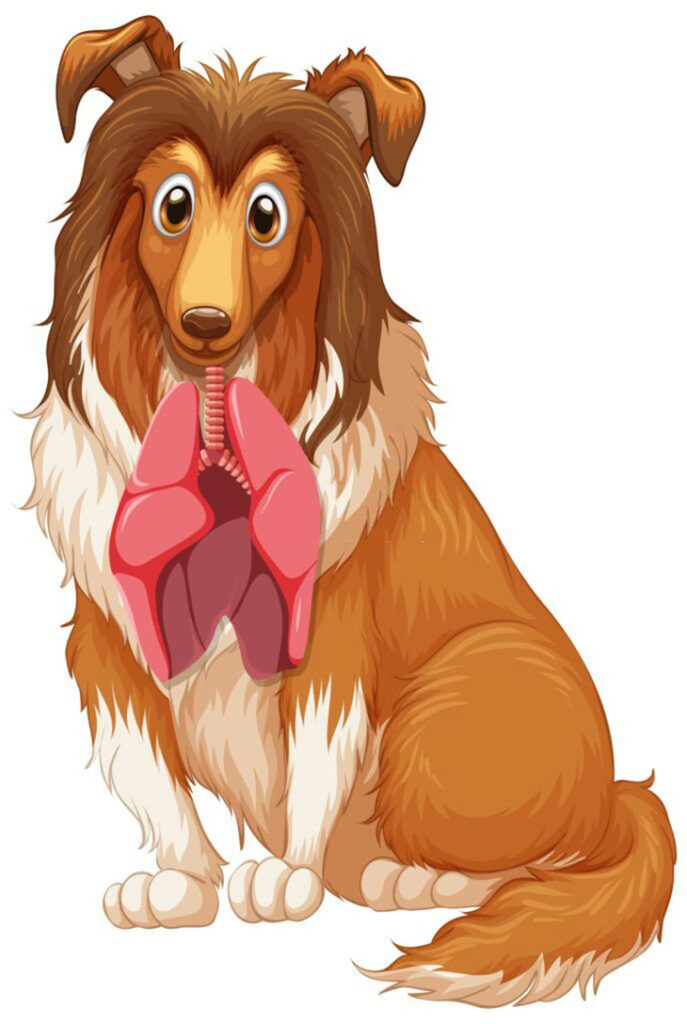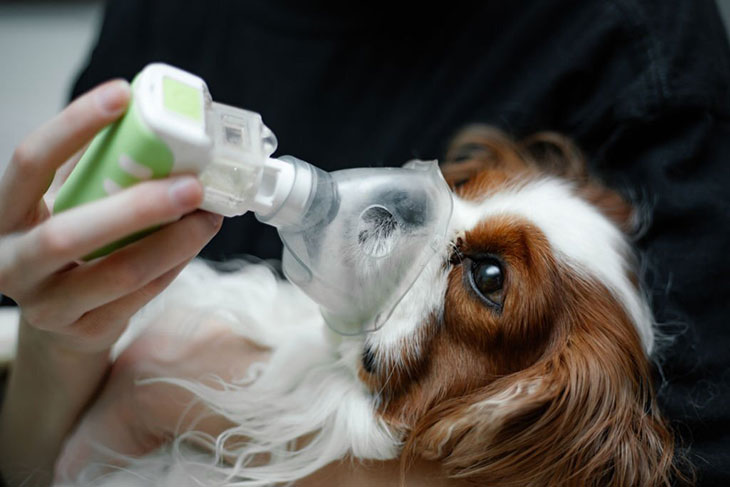Why is it important to know about the dog pneumonia survival rate?
Pneumonia (or pneumonitis) constitutes a serious disease related to dogs’ respiratory system. And it can affect your pets of any breed or age.
Sometimes, dogs also find breathing difficult when suffering from pneumonitis, just like humans.
Due to several underlying causes, pneumonia is a contagious disease. The case could even turn bad if the dog has many puppies.
With different, it is never a good idea to leave them untreated. The dog needs suitable treatment at once; otherwise, a life-threatening situation will come.
So, how is the dog or puppy pneumonia survival rate?
Is The Dog Pneumonia Survival Rate High Or Low?

The survival rate for a mild pneumonia case ranges from 77% to 82%.
However, the condition could worsen if the illness develops into ARDS (acute respiratory distress syndrome). Or a decrease will be found in the dog’s possibility of being alive.
Because of the ARDS, your “little friends” often require mechanical ventilation to get more comfortable.
Not only that, numerous other important things to know about pneumonitis. Here they are.
What is Dog Pneumonia?
Pneumonia is a complex illness in dogs. It involves the lungs and alveoli.
For a better understanding, inflamed lungs can lead to a fluid buildup in the alveoli (also the tiny air sacs).
Dogs of any age, size, and breed can suffer from this disease. They may inhale water, food, etc., and then vomit those materials into their lungs or airway.
The bacteria, as a consequence, weakens the vulnerable-to-infection lung. In turn, it results in problems in respiration and other serious complications.
As for pneumonitis types in dogs, bronchopneumonia and hematogenous pneumonia are common.
- Bronchopneumonia: It arises from the airway infections, like the way in the respiratory tract.
- Hematogenous pneumonia: It is the result of a condition in which pathogens pass through the bloodstream, and then affect the lungs.
That is a quick description of pneumonitis. But how did my dog get pneumonia?
What Causes Pneumonia In Dogs?
When it comes to dog or puppy pneumonia, many potential risks result in the disease. The type of pneumonia led by different causes will not be the same.
Recognizing the cause is also a good way for you to aid in treatment and prevention.
The four main causes are infection, viral infection, aspiration, and inhalation. So, what are they?
Infection
How do puppies get pneumonia, or even the dogs? The disease can stem from bacterial infection – one of the most common causes.
The bacteria like Bordetella bronchiseptica originates from its microflora with a weakened immune system.
These bacteria are responsible for the direction of infection or from dog to dog.
Viral Infection
It is not a normal infection. On the other hand, it is a secondary infection of viral pneumonia like parainfluenza and influenza.
For more detail, there are multiple pathogens, including Canine Adenovirus-2, Parainfluenza Virus, etc.
Aspiration
Another factor leading to pneumonitis is aspiration, when a foreign material enters the dog’s airway.
They could be food, gastric, or stomach contents, etc. These foreign substances affect the vulnerable lungs and help pneumonitis develop.
Inhalation
One more non-infectious agent triggering pneumonitis is foreign material inhalation. The particulates needed to mention include smoke and gaseous chemicals.
They enter the lower respiratory tract and then cause pneumonitis.
In some cases, dogs may inhale spores – the main agent for the fungal infection. Shared toys, bowls, … in places like boarding facilities are all potential pneumonitis transmission.
In comparison, the respiratory system of dogs tends to be more sensitive than ours.
Environmental irritants such as smoke and pollutants can result in airway inflammation and irritation. Both of them are causes of pneumonia in dogs, too.
The dog pneumonia treatment cost, in general, is always unpredictable if your canine “boys and girls” have this illness untreated.
So, there are many things you need to know for good preparation.
What Do You Need To Know To Save Your Pets?

It is not hard to know how to cure pneumonia in dogs. But it would be better to discuss the symptoms first.
Symptoms Of Pneumonia In Dogs
The classification of dog pneumonia consists of three levels. Each of them comes with different symptoms based on the disease severity.
Mild Level
This case of disease often shows several complications and symptoms which are not too severe. A loss of appetite is the most common sign.
Despite that illness, dogs still experience normal energy for activities. With the mild level, it takes days or weeks for dogs to recover without continued treatment.
Moderate Level
Unlike mild cases, moderate ones irritate dogs with some significant complications.
The canine “boys and girls” suffer from fever (sweat in sleep), inappetence, and respiratory distress.
In many cases, the dogs diagnosed with moderate pneumonitis may go into a deep coma or seizure. Hence, visiting a vet for proper treatment immediately is very important.
Severe Level
Undoubtedly, the severe level will trigger severe complications such as shock and respiratory failure.
When reaching this level of illness, dogs experience a sluggish state. In other words, they do activities with less or even no energy.
In particular, these cases require proper treatment as quickly as possible. If not, dogs could go into a coma or even die.
In addition to the three levels of symptoms mentioned above, there are other signs of pneumonitis in dogs. Some of them are below.
- Moist cough, rapid breathing
- Nasal discharge
- Wheezing
- Lethargy
- Tachypnea
- Weight loss
- Dyspnea
- Dysphagia
- Weakness
- Altered mentation
- Dysphagia
- Exercise intolerance
If some of those clinical signs come, our high recommendation is to visit a vet to have the proper treatment for dog pneumonia.
The earlier you help your dogs, the better their chance to recover. So, what is the right treatment?
Proper Treatments
It is up to you to visit a vet to have an accurate diagnosis or try home treatment for dog pneumonitis. The description below can help you make the right decision.
Seeing A Vet Veterinary Care
This option is suitable for infectious bacterial treatment with diagnostic tests. Vets will prescribe common liquid medications against pain and fever.
In particular, hospitalization is necessary for more intensive therapies of severe cases. At that time, dogs need the support of intravenous antibiotic therapy, fluid therapy, or supplemental oxygen therapy.
Trying The Home Treatment
Mild pneumonitis cases will not require complicated treatment. Hence, you can try some supportive care to help your canine friends.
- Providing the dog with a high-quality diet to help them deal with a loss of appetite.
- Clearing up the dried mucus as a steam treatment gives the dog’s airway a better moisturization.
How Long Can A Dog Recover From Pneumonia?

Generally, the time for a dog to recover from pneumonitis is not the same for every case. It often depends on the severity of disease, causes, medical history, and overall health.
For the mild and moderate cases, the dogs need weeks for recovery, while it may take longer in cases of very high severity (maybe a few months).
Conclusion
Whether the dog pneumonia survival rate is high or low often depends on severe symptoms.
With any level of illness (mild, moderate, or severe), proper treatment at once can give your pets a better chance of recovering.
For further information on medical advice, feel free to let us know. The more knowledge you learn about this disease in dogs, the better you can help your canine boys and girls.
